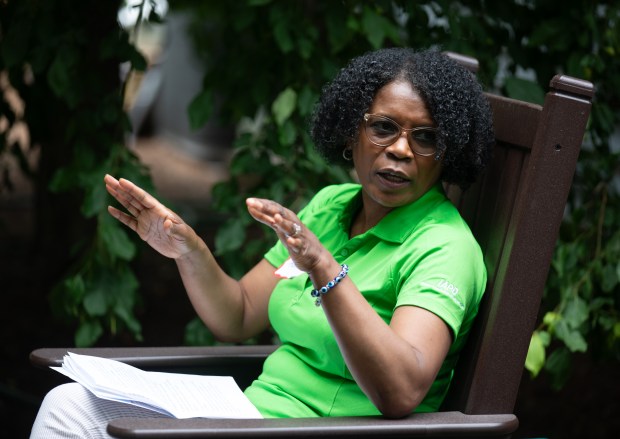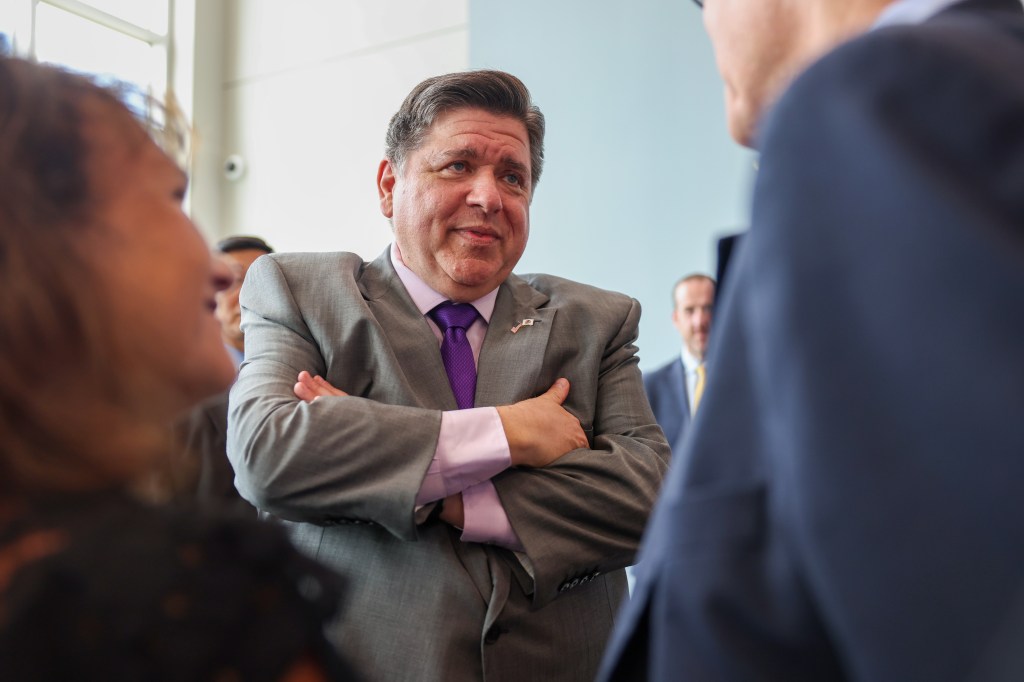A recent veto from Gov. JB Pritzker puts him at odds with nonprofits, labor unions and some state Democrats who say he blocked what would have been an advantageous investment option at a time when the organizations are feeling tightening pressure from Washington.
The governor issued a veto late Friday on a three-page bill that would have allowed fellow Democrat Illinois State Treasurer Michael Frerichs to create an investment pool for nonprofits and labor organizations. The treasurer would then be able to invest it in the same way he invests state treasury funds, resulting in potentially lower fees and greater returns than the options available to nonprofits now, according to bill supporters.
In vetoing it, Pritzker said he had concerns extremist groups with nonprofit arms could also benefit from the pool.
“This is not an exercise in hypotheticals — hate groups are growing,” Pritzker wrote in a statement. He acknowledged there are safeguards against hate groups from qualifying for nonprofit status but added that “recent changes in policies, rules and decision-making at the federal level suggest the trend is to accept extreme views.”
The treasurer said in a statement that Pritzker’s belief that hate groups would use the fund was “misguided.” And nonprofit leaders said Monday that while they understand the governor’s concerns over extremism, they’re looking for any policy solutions that relieve some financial pressure, especially for smaller groups.
“Nonprofits are going to be on a big funding diet,” Horacio Mendez, president and CEO of the nonprofit Woodstock Institute, said about the atmosphere emanating from President Donald Trump’s administration that is curtailing giving to nonprofits. “So every dollar matters in terms of fees you’re paying.”
For Mendez’s nonprofit, which focuses on accountability in financial services, the current options for the organization to manage money in an affordable way aren’t tailored to the group’s values, including investing in bank stocks or oil companies, he said. He said he preferred the offerings that would have been possible through the state.
The treasurer manages the state’s assets and makes investments in areas such as U.S. Treasury notes and Illinois banks.
The Woodstock Institute joined some 150 others — AFL-CIO of Illinois, the nonprofit membership group Forefront and the Sierra Club, among them — and the state treasurer in expressing support for the bill before it was vetoed.
The Illinois Bankers Association, Community Bankers Association of Illinois and the Illinois Credit Union League filed witness slips opposing the bill during the legislative session. Ben Jackson, executive vice president at the Illinois Bankers Association, said his group welcomed the governor’s veto to avoid a situation where the fund could “compete unfairly with community banks who are serving nonprofits in their neighborhoods.”
Democratic state Rep. Rita Mayfield of Waukegan, one of the bill’s main sponsors, said she thought the issues with ideologically extreme groups could be solved through rulemaking “so that individuals that were part of hate groups would not be allowed to take advantage of the pool.”
But Pritzker said making rules on a government program, including restrictions on ideology, “could give rise to legal challenges.”
Mayfield, the main House sponsor of the measure, said the legislature tried to work with the governor’s office to address its issues, and that “they provided us with language that basically would have just killed the bill.” Instead, lawmakers went with language provided by the treasurer’s office.
“It would have been dead on arrival. They knew that. It was a poison pill,” Mayfield said of the governor’s bill suggestions.
State Sen. Adriane Johnson, a Democrat from Buffalo Grove and the main Senate sponsor of the legislation, said the effort to pass the measure was sparked by one of the townships in her north suburban district that has a food pantry. Her goal, she said, was to give nonprofits “the same secure and reliable investment opportunities as government entities.”

Despite the governor’s veto, Johnson said she’d discuss the issue with Pritzker’s administration and her legislative colleagues before and during October’s two-week fall veto session with the goal of passing legislation “that will uplift nonprofit organizations that so many people and constituents (in her district) and beyond rely on.”
Lawmakers would need a three-fifths majority to override the governor’s veto, votes the bill received in the House but not in the Senate during the spring session. In the House, the bill passed along party lines 73-39, while in the Senate, it passed largely along party lines, 33-17, just shy of the 36 that will be needed to override.
During the brief House floor discussion about the bill May 28, state Rep. Jeff Keicher, a Republican from Sycamore who voted against the legislation, said he felt the legislation would enable the treasurer’s office to give a “state government endorsement” to organizations involved in social advocacy, climate policy and anti-corporate campaigns — causes that tend to divide the state’s two major political parties.
“My concerns arise that the treasurer’s office is now going to be able to host accounts that will be a platform to further political influence,” Keicher said. “It’s a slippery slope.”
Originally Published:

